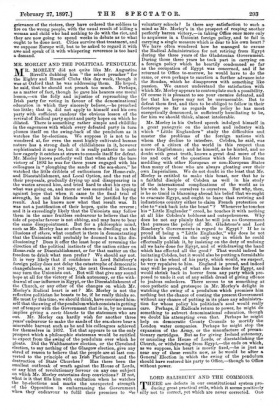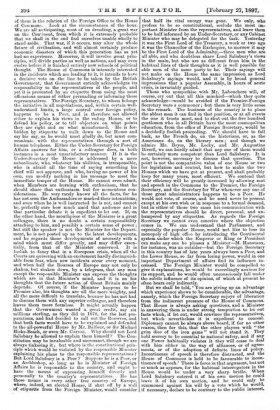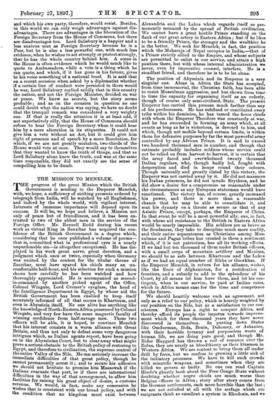LORD SALISBURY AND THE COMMONS.
rERE are defects in our constitutional system pro- ducing great practical evils, which it seems positively silly not to correct, yet which are never corrected. One of them is the relation of the Foreign Office to the House of Commons. Look at the circumstances of the hour. We are all anticipating, most of us dreading, a great war on the Continent, from which it is extremely probable that we shall in the end find ourselves unable wholly to stand aside. That war, if it occurs, may alter the whole future of civilisation, and will almost certainly produce economic disasters of which this generation has as yet had no experience. Moreover, it will involve great prin- ciples, will divide parties as well as nations, and may even evolve before it is finished entirely new schools of political thought. The House of Commons is intensely interested in the incidents which are leading to it, it intends to have a decisive vote on the line to be taken by the British Government, that Government entirely acknowledges its responsibility to the representatives of the people, and yet it is prevented by an etiquette from using the most efficacious means of either persuading or informing those representatives. The Foreign Secretary, to whom belongs the initiative in all negotiations, and, within certain well- understood limits, a large control over foreign policy, happens to be a Peer, and is therefore not allowed either to explain his views in the ruling House, or to defend his policy, or to tell objectors on -what points they are right and on what misinformed. He is for- bidden by etiquette to walk down to the House and say his say, as he would most gladly do, but must com- municate with the representatives through a sort of human telephone. Either the Under-Secretary for Foreign Affairs answers for him, or a colleague does, in both instances in a most unsatisfactory manner. If it is the Under-Secretary the House is addressed by a mere subordinate, who, whatever his abilities, is irresponsible, who is afraid all the time of saying something his chief will not approve, and who, having no power of his own, can modify nothing in his message to meet the immediate temper of the House. He cannot even admit, when Members are burning with enthusiasm, that he should share that enthusiasm but for momentous con- siderations. He very rarely knows all the facts, for he has not seen the Ambassadors or marked their intonations; and even when he is well instructed he is not, and cannot be, perfectly sure how much amid that audience and in that particular debate it is expedient to let out. If, on the other hand, the mouthpiece of the Minister is a great colleague, there is no doubt a certain responsibility attaching to him, and possibly a certain sense of power ; but still the speaker is not the Minister for the Depart- ment, he is not posted up as to the latest developments, and he regards those developments of necessity with a mind which must differ greatly, and may differ essen- tially, from that of the Minister concerned. It is foolish to fancy that in a European crisis, when all the Courts are quivering with an excitement hardly distinguish- able from fear, when new incidents occur every moment, and when half the Bourses of Europe may not only be shaken, but shaken down, by a telegram, that any man except the responsible Minister can express the thoughts which are in that Minister's mind, and it is on his thoughts that the future action of Great Britain mainly depends. Of course, if the Minister happens to be Premier also, his thoughts are all the more weighty, and all the more difficult to translate, because he has not had to discuss them with any superior colleague, and therefore leaves them more formless. It might actually happen that the Government wanted a great credit, say six millions sterling, as they did in 1878, for the last pre- parations, and had decided to call out the Reserves, and that both facts would have to be explained and defended to the all-powerful House by Mr. Balfour, or Sir Michael Hicks-Beach, or even Mr. Curzon. Why should not Lord Salisbury be allowed to explain them himself ? The Con- stitution may be invaluable and sacrosanct, though we are always tinkering it ; but where is the constitutional prin- ciple which would be violated by the responsible Minister explaining his plans to the responsible representatives ? But Lord Salisbury is a Peer ? Suppose he is a Peer, or an Archbishop, so long as he is Minister of Foreign Affairs he is responsible to the country, and ought to have the means of expressing himself directly and personally to the country's representatives. He has those means in every other free country of Europe, where, indeed, an elected House, if shut off by a wall of etiquette from the Foreign Illinister, would consider that half its vital energy was gone. We only, who profess to be so constitutional, seclude the most im- portant Minister from the representatives, and leave them to be half informed by an Under-Secretary, or any Cabinet Minister who may be delegated for the task. Yesterday it was the First Lord of the Treasury, a week or two ago it was the Chancellor of the Exchequer, to-morrow it may be the First Lord of the Admiralty,—three men who are all able, and who doubtless share Lord Salisbury's views in the main, but who are as different from him in the habitual lines of their thoughts as it is well possible for able men of the same party to be. Their sayings will not make on the House the same impression as Lord Salisbury's sayings would, and it is by broad general impressions that a popular Assembly, in hours of acute crisis, is invariably guided.
Those who sympathise with Mr. Labouchere will, of course, cry out that all this mischief—which they quite acknowledge—would be avoided if the Premier-Foreign Secretary were a commoner ; but there is very little sense in the remark. The business of the country is to place the ablest man it can find in that position, or at all events the one it trusts most, and to shut out the five hundred gentlemen who in all Britain have the most cosmopolitan education, from the office of Foreign Secretary, would be a decidedly foolish proceeding. We should have to fall back, as the French do, on the historians, or, as the Americans do, on the literary men ; and though we admire Mr. Bryce, Mr. Lecky, and Mr. Augustine Birrell, we can hardly admit that any one of them would be certainly more competent than Lord Salisbury. It is not, however, necessary to discuss that question. The point is not the comparative value of one House or two for legislation and control, but how to make the two Houses which we have got at present, and shall probably keep for many years, most efficient. We contend that their efficiency will be greatly increased by allowing seat and speech in the Commons to the Premier, the Foreign Secretary, and the Secretary for War whenever any one of those great administrators happens to be a Peer. He would not vote, of course, and he need. never be present except at his own wish or in response to a formal demand, but in either of those two cases his communication with the representatives should be direct, personal, and un- hampered by any etiquettes. As regards the Foreign Secretary we cannot even conceive where the objection comes in. We can understand that Parliament, and especially the popular House, would not like to lose its monopoly of high office by introducing the Continental system under which the Emperor or King or President can make any one he pleases a Minister—M. Hanotaux, for instance, was an outsider—but the Foreign Secretary in this country has of late years always been a Peer, and the Lower House, so far from losing power, would in one important Department of affairs find its influence in- creased. The Foreign Minister would be compelled to give it explanations, he would be exceedingly anxious for its support, and he would often unconsciously fall under the subtle influence of its opinion, of which at present he often hears only indirectly. But we shall be told, You are giving up an advantage which experience shows to be considerable, the advantage, namely, which the Foreign Secretary enjoys of liberation from the indiscreet pressure of the House of Commons. That House is always asking questions, and a Minister in answering them is under strong temptation to let out facts which, if let out, would convince the representatives, but which nevertheless it is expedient to conceal. Diplomacy cannot be always above board, if for no other reason, then for this, that the other players with " the grim dice of the iron game " will not stand it. They hold secrecy to be essential to national safety, and if any one Power habitually violates it they will cease to deal with him either in the way of alliances, or of agree- ments, or of the adoption of definite lines of policy. Incontinence of speech is therefore distrusted, and the House of Commons is held to be favourable to incon- tinence of speech.' There is force in that argument, but not so much as appears, for the habitual interrogators in the House would be under a very sharp bridle. When Lord Salisbury entered it of his own motion he could leave it of his own motion, and he could only be summoned against his will by a vote which he would, if necessary, declare to be contrary to the public interest. and which his own party, therefore, would resist. Besides, in this world we can only weigh advantages against dis- advantages. There are advantages in the liberation of the Foreign Secretary from the House of Commons, but there are disadvantages too. Lord Salisbury is a happier and a less anxious man as Foreign Secretary because he is a Peer, but he is also a less powerful one, with much less evidence, when he wishes to act strongly or protest strongly, that he has the whole country behind him. A scene in the House is often evidence which he would much like to quote to Ambassadors, while a vote is a thing which he can quote, and which, if it has gone in his favour, gives to his voice something of a national brool. It is said that on a recent occasion when asked by a diplomatist whether if a certain line of conduct were persisted in there would be war, Lord Salisbury replied mildly that in this country the nation, and not the Foreign Minister, decided on war or peace. We know no secrets, but the story seems probable ; and as on the occasion in question no one could doubt what the nation was saying, we have no doubt that the tranquil remark was considered a very weighty one. If that is really the situation it is at least odd, if not superlatively silly, that the House of Commons should refuse to hear the Foreign Secretary when it could hear him by a mere alteration in its etiquettes. It could not give him a vote without an Act, but it could give him right of presence and of speech by a mere Resolution, for which, if we are not greatly mistaken, two-thirds of the House would vote at once. They would say to themselves that they wanted to know the truth of things, and that as Lord Salisbury alone knew the truth, and was at the same time responsible, they did not exactly see the sense of compelling him to be dumb.




































 Previous page
Previous page